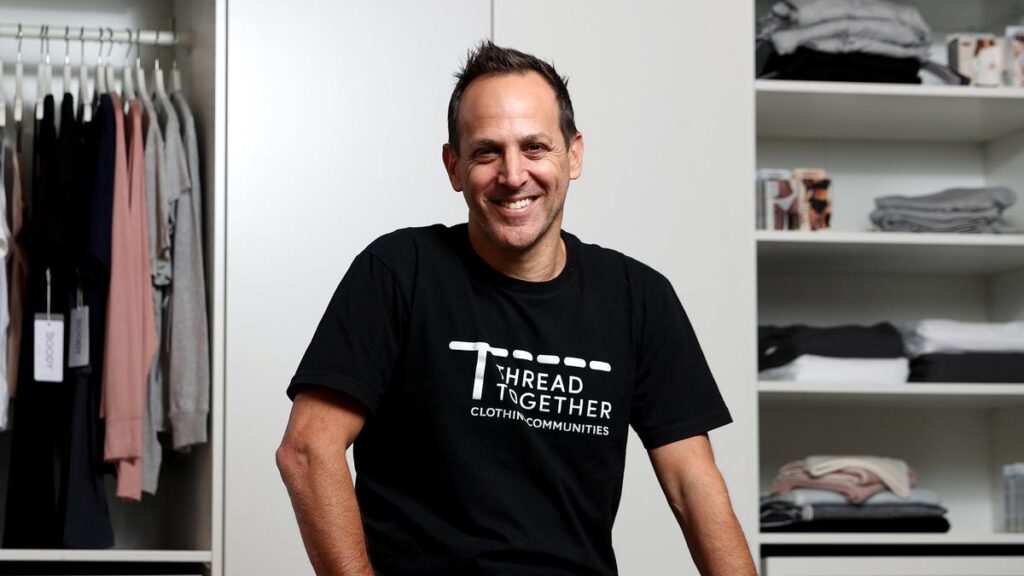When experiencing hardship such as homelessness, mental health difficulties and domestic violence, something as simple as a new outfit can feel like a fresh start.
That’s the philosophy behind Thread Together, an industry-leading charity redistributing Australia’s unfathomable amount of excess new clothing to those who need it most.
The organisation has now expanded into Western Australia and is ready to help improve lives across the State through hundreds of agencies connected to communities.
“A third of new clothing doesn’t get sold, and no one really talks about how big a problem that is,” says Anthony Chesler, CEO of Thread Together.
“At the same time, in Australia about one in eight adults and one in six children are living in poverty . . . Clothing is a basic human right, yet for too many Australians it is out of reach.”
Fashion heavyweights including DISSH, Country Road and David Jones are among the growing number of brands choosing to donate their unsold garments to the cause — ensuring unsold stock ends up in the hands of those in need rather than in landfill.

Thread Together delivers clothing through four key channels: an online service that supports charities and caseworkers nationwide; mobile wardrobe vans; community clothing hubs; and permanent wardrobes installed in women’s shelters.
Mr Chesler says certain encounters have left a lasting impression during his time at Thread Together — from a heavily pregnant woman in a shelter who described receiving new clothes as “humanising”, to a man who lost everything in a flood, and another who had just stepped out of jail with nothing but the clothes on his back.
“Being able to provide new clothes for new beginnings to women and children at a shelter, for example, is a very powerful service —not just to help them to regain their dignity but to give them the opportunity to feel empowered through access to clothing,” he says.
Mr Chesler says the charity is “in talks” with potential partners in the UK and the US who recognise the fashion industry’s excess issue and want to be part of the solution.
Circular fashion expert and researcher Lisa Piller says 880 million items were sent to landfill last year in Australia, including 47 million unsold garments from brands. She notes the rise in cheap and synthetic clothing has seen items “made faster, worn less, and discarded more”.
“Thread Together does incredible work connecting unsold clothing with people who need it most,” she says. “Their expansion into WA is especially welcome. In a vast State like ours, where distance and access can make life harder for those doing it tough, this initiative brings dignity and comfort in a very practical way.
“But clothing overproduction is a major problem. Australians now buy an average of 55 items a year — the highest in the world — paying just $13 per piece.
“While initiatives like Thread Together help keep clothes in circulation and restore dignity to those in need, the sheer scale of overproduction means we must also tackle the issue at its source. The solution lies in producing fewer, better-quality garments that can be reused or redistributed. Clothes made with integrity have a much longer life in the cycle.”
For those wanting to donate or volunteer, see threadtogether.org.
Spotlighting other local circular fashion initiatives
Circular Fashion Festival
Last weekend Perth held its first Circular Fashion Festival at Yagan Square championing sustainable style and practices. The team of passionate entrepreneurs who led the viral Stop Shein pop-up petition were behind it, and it was an impressive celebration of pathways to a more sustainable future of fashion. To stay in the loop for their future events and activations, follow their Instagram @circularfashionfestival or see circularfashionfestival.com.au.
Loop Upcycling
A social enterprise repurposing redundant workwear into new products that can remain in the fashion cycle. Loop Upcycling (@loopupcycling and loop.org.au) was created in 2017 as a sustainable solution to Virgin Australia’s used uniforms, becoming the first company tackling corporate textile waste in WA.
Circular Textile Working Group WA
Formed in early 2024, CTWG WA brings together more than 80 members from across the State’s textile and fashion sectors — spanning local government, education, design, and manufacturing — to drive practical action on circularity. Through hosting networking and sharing events, advocacy and consultation, and stakeholder collaboration, the group works to reduce textile waste, promote reuse and recycling, strengthen local supply chains, and inspire behaviour change.
Luxe Dress Hire by Vinnies
A dress hire boutique in Subiaco which donates 100 per cent of its profits to women in need through Vinnies WA. It provides a sustainable solution to finding an outfit for black-tie and cocktail events, while raising funds for local women experiencing hardship.
https://thewest.com.au/lifestyle/fashion/wa-taking-circular-fashion-up-a-notch-with-new-sustainable-initiatives-c-20266109


